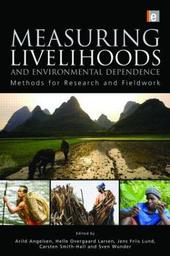
|
Measuring Livelihoods and Environmental Dependence: Methods for Research and Fieldwork
Paperback
Main Details
| Title |
Measuring Livelihoods and Environmental Dependence: Methods for Research and Fieldwork
|
| Authors and Contributors |
Edited by Arild Angelsen
|
|
Edited by Helle Overgaard Larsen
|
|
Edited by Jens Friis Lund
|
|
Edited by Carsten Smith-Hall
|
|
Edited by Sven Wunder
|
| Physical Properties |
| Format:Paperback | | Pages:288 | | Dimensions(mm): Height 234,Width 156 |
|
| Category/Genre | Development economics |
|---|
| ISBN/Barcode |
9781849711333
|
| Classifications | Dewey:338.10723 |
|---|
| Audience | | Postgraduate, Research & Scholarly | |
|---|
| Illustrations |
Line drawings, figures, index
|
|
Publishing Details |
| Publisher |
Taylor & Francis Ltd
|
| Imprint |
Earthscan Ltd
|
| Publication Date |
23 March 2011 |
| Publication Country |
United Kingdom
|
Description
Thousands of surveys on rural livelihoods in developing countries are being done every year. Unfortunately, many suffer from weaknesses in methods and problems in implementation. Quantifying households' dependence on multiple environmental resources (forests, bush, grasslands and rivers) is particularly difficult and often simply ignored in the surveys. The results therefore do not reflect rural realities. In particular, 'the hidden harvest' from natural resources is generally too important to livelihoods for development research, policies and practice to ignore. Fieldwork using state-of-the-art methods, and in particular well-designed household questionnaires, thus becomes an imperative to adequately capture key dimensions of rural welfare. This book describes how to do a better job when designing and implementing household and village surveys for quantitative assessment of rural livelihoods in developing countries. It covers the entire research process from planning to sharing research results. It draws on the experiences from a large global-comparative project, the Poverty Environment Network (PEN), to develop more robust and validated methods, enriched by numerous practical examples from the field. The book will provide an invaluable guide to methods and a practical handbook for students and professionals.
Author Biography
Arild Angelsen is a Professor of Economics & Resource Management at the Norwegian University of Life Sciences (UMB) and a Senior Associate of the Center for International Forestry Research (CIFOR), Indonesia. He is coordinator of the Poverty and Environment Network (PEN) and has broad experience from research in design and management and fieldwork in Indonesia and Eastern Africa. Helle Overgaard Larsen is an Associate Professor at Forest & Landscape Denmark at the University of Copenhagen. She has experience with design and implementation of social-ecological research, including household surveys, fieldwork in Nepal and Tanzania. She is currently teaching research planning. Jens Friis Lund is an Associate Professor at Forest & Landscape Denmark at the University of Copenhagen. He is a resource person of PEN and has done research on rural livelihoods in Tanzania, Ghana and Nepal. Carsten Smith-Hall is a Professor at Forest & Landscape Denmark at the University of Copenhagen. He has directed several international collaborative research and educational programmes and published results in both natural and social science journals. Sven Wunder is Principal Economist with the Center for International Forestry Research, Rio de Janeiro, Brazil, where he has worked for the last 10 years. He is author of numerous books, articles and chapters on payments for environmental services, tropical deforestation, and is a co-founder of PEN.
Reviews'This study, led by world renowned scholars and scientists, sets new standards for efforts to understand rural life, poverty dynamics, human-environment interactions, and development outcomes. A key output from the ambitious 'Poverty Environment Network (PEN)', this brilliant collection of analyses will have lasting impact on how scholars and students of poverty and environment conduct research and collect data, manage interdisciplinary collaborative work, and present policy-shaping results.' Arun Agrawal, University of Michigan, USA 'This volume provides an invaluable guide to the relationship between poverty, environment and how people benefit from natural resources. It presents practical advice on how to undertake rigorous field-based investigations and meticulously covers each stage in the research process.' Professor Katrina Brown, University of East Anglia, UK 'Household income surveys traditionally underestimate how much rural families depend on nature to earn their living. This book shows how researchers can do it right and why everyone should care.' David Kaimowitz, Director, Natural Resources and Sustainable Development, Ford Foundation 'This book provides a solid methodological foundation for designing and implementing household and village surveys to quantify rural livelihoods, with an emphasis on environmental income and reliance in developing countries.' Bruce Campbell, Director, Program on Climate Change, Agriculture and Food Security (CCAFS) of the CGIAR
|